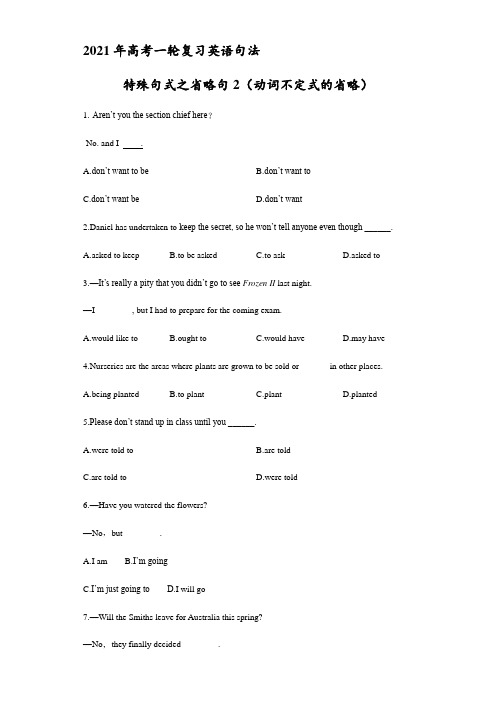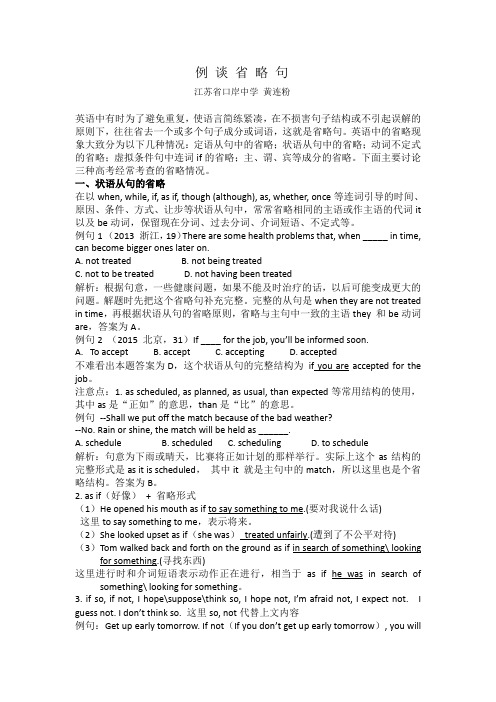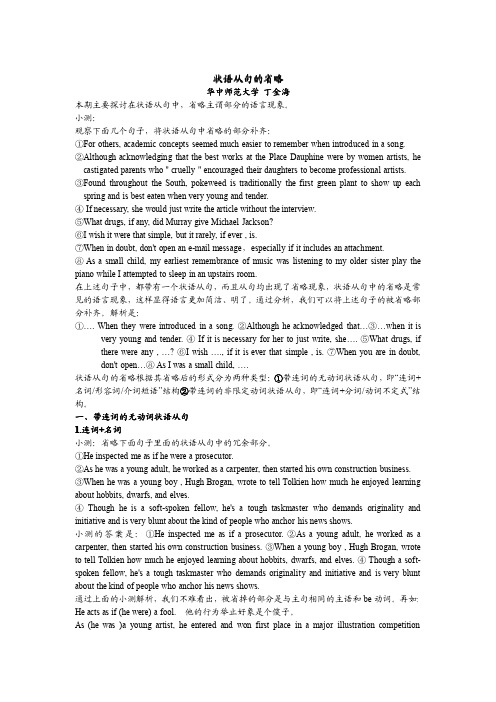状语从句主谓成分的省略
- 格式:doc
- 大小:38.00 KB
- 文档页数:5

高考英语语法——省略无论在口语中还是在书面语中,有时为了讲话简洁或行文方便,常常在不影响文意的情况下将句子中的某些成分略去,这种现象称为省略。
纵观历年高考试题,”省略”在单项填空中频频出现.简单句中的省略1、省略主语祈使句中主语通常省略;其它省略主语多限于少数现成的说法。
(1)(I)Thank you for your help。
(2)(I) See you tomorrow.(3)(It)Doesn't matter.(4) (I)Beg your pardon。
2、省略主谓或主谓语的一部分(1)(There is)No smoking 。
(2)(Is there) Anything wrong ?(3) (Will you)Have a smoke ?(4) What/How (do you think) about a cup of tea ?(5) Why (do you)not say hello to him ?3、省略作宾语的不定式短语,只保留to,但如果该宾语是动词be或完成时态,则须在之后加上be或have:(1)–Are you going there?——Yes,I’d like to (go there)。
(2)He didn't give me the chance,though he had promised to (give me the chance)。
(3) –Are you an engineer? ——No,but I want to be。
(4)–He hasn’t finished the task yet. —-Well,he ought to have.4、省略表语(1) –Are you thirsty? ——Yes,I am (thirsty)。
(2)His brother isn’t lazy, nor is his sister (lazy).5、同时省略几个成分(1)Let’s meet at the same place as (we met)yesterday。

状语从句的省略状语从句是在复合句中充当状语的子句,用来修饰主句中的动词、形容词或副词。
通常情况下,状语从句必须完整地表达出来,但在某些情况下,可以省略部分成分。
本文将探讨状语从句的省略现象,并分析其使用的要点和限制。
一、状语从句的基本结构和功能状语从句通常由连词引导,可以分为时间、条件、原因、目的、结果、让步等不同类型。
这些状语从句的结构包括主语、谓语和其他从句成分,通常以陈述语序表示。
其功能是为主句提供补充信息,进一步说明主句的动作、状态或条件。
例如:1. 时间状语从句:当他到达机场时,飞机已经起飞了。
2. 条件状语从句:如果你学习努力,你将取得好成绩。
3. 原因状语从句:因为下雨,所以他没有去上班。
4. 目的状语从句:我为了锻炼身体,每天都去健身房。
5. 结果状语从句:他非常努力学习,以便考上好大学。
6. 让步状语从句:虽然天气很热,但他还是坚持跑步锻炼。
二、状语从句的省略规则和应用在一些情况下,状语从句中的某些成分可以被省略,从而简化句子结构,使句子更加简洁流畅。
以下是常见的状语从句省略的情况及其使用规则:1. 时间状语从句省略:在主句的谓语动词和时间状语从句的谓语动词相同时,时间状语从句的主语和谓语可以省略。
例如:- He will leave when [he] gets the phone call.- He always reads while [he] is on the bus.2. 条件状语从句省略:条件状语从句中的"if"和主句中的"will"或"would"可以省略,从而简化句子结构。
例如:- If [you] have any questions, [please] let me know.- [If] [it] rains tomorrow, [we] will stay at home.3. 原因状语从句省略:原因状语从句中的"because"可以省略,同时主句中的主语和谓语动词要借用原因状语从句中的成分来填补。

2021年高考一轮复习英语句法特殊句式之省略句2(动词不定式的省略)1.-Aren’t you the section chief here?-No. and I .A.don’t want to beB.don’t want toC.don’t want beD.don’t want2.Daniel has undertaken to keep the secret, so he won’t tell anyone even though ______.A.asked to keepB.to be askedC.to askD.asked to3.—It’s really a pity that you didn’t go to see Frozen II last night.—I ________, but I had to prepare for the coming exam.A.would like toB.ought toC.would haveD.may have4.Nurseries are the areas where plants are grown to be sold or ______ in other places.A.being plantedB.to plantC.plantD.planted5.Please don’t stand up in class until you ______.A.were told toB.are toldC.are told toD.were told6.—Have you watered the flowers?—No,but ________.A.I amB.I’m goingC.I’m just going toD.I will go7.—Will the Smiths leave for Australia this spring?—No,they finally decided ________.A.not to leaveB.not leavingC.not toD.not to be leaving8._____ on smart phone to entertain themselves ______________ know what to do while going out without it.A.Such does the dependence; as not toB.Such dependence does; to notC.So dependent are they; as not toD.So do they depend; not to9.The boss asked Tim to go and out if there was anyone else absent.A.findB.findingC.to findD.found10.Tom told the news to everybody in the classroom. Why didn’t you tell him _______?A.not to be doneB.not do itC.not toD.do not to11.—Why didn’t you turn up at the opening ceremony? I was waiting for you all the time.—I . But I had some urgent business to deal with then.A.would like toB.would like to haveC.would like to beD.would like to have attended12.The driver stopped the car a cat across the street.A.to let; to walkB.letting; walkC.letting; walkingD.to let; walk13.—What’s your dream?—Well, my parents wouldn’t expect me to be a banker, but I still.A.hope toB.hope soC.hope notD.hope for14.Are you chairman? --- No, and I _________.A.don’t want toB.don’t wantC.don’t want to beD.don’t want be15.The boy wanted to ride his bicycle in the street, but his mother told him_____.A.not to doB.not toC.not did itD.don’t do it16.I can’t imagine what air we would be breathing in if we __________ anything to stop air pollution.A.hadn’t doneB.didn’t doC.haven’t doneD.don’t do17.—Mr. Scott has received the invitation to his ex-girlfriend’s wedding ceremony this weekend. Will he attend it?—No, he has finally decided _____.A.notB.not toC.not to goD.not to go to18. —Hi, are you a student of this University?—No, but I ________.A.want toB.want to beC.want soD.want it19.It is believed that life in the twenty--first century is much easier than ________ .A.that used to beB.it is used toC.it was used toD.it used to be20.Johnny wanted to ride his new bicycle in the street, but his mother told him _____.A.not toB.not do itC.not to doD.do not21. The driver wanted to park his car near the roadside but was asked by the police ______.A.not to doB.not doC.not toD.do not22.(2013·新课标全国卷Ⅰ)The driver wanted to park his car near the roadside but was asked by the police ________.A.not to doB.not toC.not doD.do not23.— Would you please join us in this computer game?—Thank you, but I’d rather________.A.not toB.not joinC.not doD.not24.He is taller than he .eded to beed toed to do25.-You seem to know little about Yancheng Middle School. Aren’t you a teacher here?-No, but I ________.A.hope toB.hope thatC.hope itD.hope to be26.---Are you a teacher?---No, but I ________.ed toB.was used toed to beed to do27.We were told not to touch the equipment in the laboratory unless ________.A.allowed to doB.allowing to doC.allowed toD.allowing to28.----Will you go home tomorrow evening?----No, I’m going to a lecture, or at least I’ m planning _________.A.toB.soC.thatD.it29.— Who are you going to have _______ this letter for you? — My secretary.A.typeB.typedC.been typedD.been typing30.I’m sorry if I hurt your feelings. I didn’t _______.A.expect toB.mean toC.do thatD.hope so31.–What’s the matter with Della?–Well, her parents wouldn’t allow her to go to the party, but she still _________.A.hopes toB.hopes soC.hopes notD.hopes for答案与解析1.A【详解】考查省略句。

例谈省略句江苏省口岸中学黄连粉英语中有时为了避免重复,使语言简练紧凑,在不损害句子结构或不引起误解的原则下,往往省去一个或多个句子成分或词语,这就是省略句。
英语中的省略现象大致分为以下几种情况:定语从句中的省略;状语从句中的省略;动词不定式的省略;虚拟条件句中连词if的省略;主、谓、宾等成分的省略。
下面主要讨论三种高考经常考查的省略情况。
一、状语从句的省略在以when, while, if, as if, though (although), as, whether, once等连词引导的时间、原因、条件、方式、让步等状语从句中,常常省略相同的主语或作主语的代词it 以及be动词,保留现在分词、过去分词、介词短语、不定式等。
例句1 (2013 浙江,19)There are some health problems that, when _____ in time, can become bigger ones later on.A. not treatedB. not being treatedC. not to be treatedD. not having been treated解析:根据句意,一些健康问题,如果不能及时治疗的话,以后可能变成更大的问题。
解题时先把这个省略句补充完整。
完整的从句是when they are not treated in time,再根据状语从句的省略原则,省略与主句中一致的主语they 和be动词are,答案为A。
例句2 (2015 北京,31)If ____ for the job, you’ll be informed soon.A.To acceptB. acceptC. acceptingD. accepted不难看出本题答案为D,这个状语从句的完整结构为if you are accepted for the job。
注意点:1. as scheduled, as planned, as usual, than expected等常用结构的使用,其中as是“正如”的意思,than是“比”的意思。

状语从句be动词的省略及高考考查浅析作者:任冲来源:《中学生英语·教师版》2017年第11期省略现象在英语可谓是司空见惯,尤其是在状语从句中。
可以说,省略存在于任何状语从句中,也就是说在时间、地点、原因、目的、结果、条件等从句中有可能出现省略现象。
其中,在高中阶段,时间、地点、原因、条件、让步、方式状语从句中的be动词的省略现象更为普遍,在高考中也时有考察。
1. 状语从句be动词省略的目的为了追求句子的简洁,尤其是在口语中,人们多省略be动词以达到言简意赅。
例如,While waiting for him,I was reading the newspaper. 省略之后的句子,在保持句子原意和符合语法规则的情况下,是展现语言可变性和灵活性的有效途径。
2. 状语从句be动词省略的种类2.1时间状语从句,主要是由when (ever),while,as,till/until,after,before引导。
例如:He was fond of collecting stamps when (he was) 15 years old.I hope you can do me a favor if (it is) possible.When (she was) asked about her love affairs, she refused to answer.2.2 地点状语从句中,主要是由where (ever)引导。
Let’s speak English when and where (it is) possible.2.3 原因状语从句中,主要是由because, since, as引导。
Because (he was) treated partially, he felt so disappointed.Since (she is) too old, she has to be taken good care of.2.4 条件状语从句中,主要是由if,unless引导。

状语从句的省略华中师范大学丁金海本期主要探讨在状语从句中,省略主谓部分的语言现象。
小测:观察下面几个句子,将状语从句中省略的部分补齐:①For others,academic concepts seemed much easier to remember when introduced in a song.②Although acknowledging that the best works at the Place Dauphine were by women artists,he castigated parents who"cruelly"encouraged their daughters to become professional artists.③Found throughout the South,pokeweed is traditionally the first green plant to show up each spring and is best eaten when very young and tender.④If necessary,she would just write the article without the interview.⑤What drugs,if any,did Murray give Michael Jackson?⑥I wish it were that simple,but it rarely,if ever,is.⑦When in doubt,don't open an e-mail message,especially if it includes an attachment.⑧As a small child,my earliest remembrance of music was listening to my older sister play the piano while I attempted to sleep in an upstairs room.在上述句子中,都带有一个状语从句,而且从句均出现了省略现象,状语从句中的省略是常见的语言现象,这样显得语言更加简洁、明了。
倒装、强调和省略倒装Inversion英语的一般语序(自然语序Natural Order)为:主语+ 谓语动词+ 宾语(或表语)+ (状语等附加成分)。
有时为了语法上或修辞上的需要而改变这种语序。
一、语法倒装1. 句首是由某些表示地点状语的副词开头,或者方位副词、介词短语放在句首时,主谓全部倒装(Full Inversion)。
比如:here, back, down, off, in, up,hence, then, thus, often, so,out, up, away, on等,通常只用于一般现在时和一般过去时,谓语动词常用be, come, go, lie, run。
主语为主语必须是名词,如果主语是人称代词则不能完全倒装。
Here is your letter. 这是你的信。
Down came the rain. 下雨了。
Hence comes the name magnet. 由此得名“磁铁”。
Into the sky went the plane. 飞机飞向天空。
Away went the girl to the school! 这个女孩到学校去了!Off goes the woman! 那个女人走了!2. 以there开头,表示“….有….”, “There+be+主语”结构;在正式文体中,当主语不明确是一个很长的名词短语时,用“there+不及物动词+主语”结构。
There are more important matters we need to discuss.我们有很多重要的事情需要讨论。
There entered a strange little man.走进来一个奇怪而身材矮小的人。
3. 主语+ live, stand, lie, sit 等动词+(介词)地点状语的结构中常采用倒装语序。
正常语序:An old temple stands at the top of the hill.倒装语序:At the top of the hill stands an old temple.山顶上有座古庙。
多变的省略句高考常考内容:1.省略主语,主谓语或主谓的一部分 2.不定式符号to的省略 3.不定式结构中动词的省略4.状语从句中的省略5.定语从句中关系词的省略6.虚拟语气中if和should的省略7.考查not, so, neither, nor的“替代性”省略掌握好省略句,应注意以下几条:1.感官动词或使役动词(如:notice, hear, let, make)等后接不定式作宾补时省略to,被动时to不能省略。
2.在pre fer to do rather than…, cannot help but…do, nothing …but等句型中常省略to。
3.为避免重复,作某些动词(hope, want)等宾语或(tell, order, ask)的宾补时,省略不定式短语,只保留to.4.应注意状语从句、定语从句中的省略。
5.注意not ,so ,neither, nor的“替代性”省略。
6.状语从句中,如果谓语含动词be,主语又与主句主语一致或主语是it,从句中主语和be一齐省略。
7.常见的省略形式:(1)If (it is)possible[如果可能的话];(2)If (it is) necessary[如果必要的话];(3)If any: 例: Correct the mistakes in the passage if (there is) any (mistakes)比较:Do you have anything to say? (不知道对方是否有话要说,) Do you have something to say?(认为对方有话要说.)一、替代省略1. 用it, one, that,ones, those替代句子中重复出现的名词、代词或句子。
one是指代同名称的另一样东西(同类异物),代替前面句子中重复出现的可数名词;that替代特指可数或不可数名词,后面常跟有in或of短语作后置定语;it指代同名称的同样事物(同类同物)。
省略简单句中的省略1.省略主语:祈使句中的主语通常省略,其他省略主语多限于少数现成的说法See you tomorrow.Doesn’t matter2.省略主语和谓语或主谓语的一部分(Will you)have a smoke?吸支烟吗?3.there be 句型的省略(is there)anything i can do for you/4.感叹句中的省略What a beautiful flower!=what a beautiful flower it is!5.简单句中的省略在交际用语中的体现---how are you? ---(I am)fine, thank you.并列句中的省略,在由并列连词and, but, or等连接的并列句中,后面的分句可以省略与前面分句中相同的成分,以免重复。
She was young but(she was)brave.复合句中的省略1.状语从句中的省略(1)当状语从句的主语和主句的主语一致或主语是it时,从句的主语和谓语部分的be动词可以省略。
He opened his lips as if (he were)to speak.The exhibition is more interesting than (it was) expected.(2)含有if 的省略结构有:Error , if (there are)any,should be corrected.如果有的话Get up early tomorrow, if not(if you don’t get up early), you will miss the first bus.如果不的话Come tomorrow,if possible.如果可能的话I will buy a TV set if necessary.如果有必要的话If so, you must go at once.如果这样的话(3)If虚拟条件句中有should/had/were时,if可以省略,从句中的主谓要倒装Were they here now, they could help us.=If they were here now, they could help us.如果现在他们在这里,他们会帮助我们。
状语从句主谓成分的省略状语从句主谓成分的省略是英语语言在使用过程中出现的一种较普遍的语法现象,它能使语言言简意赅。
Though understanding no Chinese, the American girl was able to communicate with the other students in her class.When asking the teacher, he was very polite.Until finished, the problem was a continuous worry to me.He’ll go to the seaside for his holiday if (it is) possible.一、状语从句主谓成分的省略,须遵循下面原则:(一)当从句的主语与主句的主语一致时,从句可以省略主语,从句的谓语动词采用其V-ing 结构。
例如:Although working very hard, he failed in the final exam. (Although he worked very hard,…)After t aking the medicine, she felt much better. (After she took the medicine,…)If going there by air, we’ll have to pay twice the fare. (If we go there by air,…)(二)当从句的主语和主句的主语一致时,若从句的谓语动词是系动词be或包含be的某种形式,此时从句的主语和be动词通常可以一同省略。
常见于以下几种形式:1、连词+形容词Whenever (she is) free, she often goes shopping.她有空就去逛商店。
Work hard when (you are) young, or you'll regret.少壮不努力,老大徒伤悲。
状语从句主谓成分的省略状语从句主谓成分的省略是英语语言在使用过程中出现的一种较普遍的语法现象,它能使语言言简意赅。
Though understanding no Chinese, the American girl was able to communicate with the other students in her class.When asking the teacher, he was very polite.Until finished, the problem was a continuous worry to me.He’ll go to the seaside for his holiday if (it is) possible.一、状语从句主谓成分的省略,须遵循下面原则:(一)当从句的主语与主句的主语一致时,从句可以省略主语,从句的谓语动词采用其V-ing 结构。
例如:Although working very hard, he failed in the final exam. (Although he worked very hard,…)After t aking the medicine, she felt much better. (After she took the medicine,…)If going there by air, we’ll have to pay twice the fare. (If we go there by air,…)(二)当从句的主语和主句的主语一致时,若从句的谓语动词是系动词be或包含be的某种形式,此时从句的主语和be动词通常可以一同省略。
常见于以下几种形式:1、连词+形容词Whenever (she is) free, she often goes shopping.她有空就去逛商店。
Work hard when (you are) young, or you'll regret.少壮不努力,老大徒伤悲。
She hurried out of the room, as if (she was) angry.2、连词+名词While (he was) a young boy, he was always ready to help others.他在孩提时代就乐于助人。
He could write poems when (he was) yet a child.3、连词+现在分词While (she was) walking along the river bank, she was singing a pop song.她沿着河堤边走边唱着流行歌曲。
The boy is running impatiently here and there as if (he is) searching for something lost on the sports ground. 这男孩很不耐心地在操场上到处跑着仿佛在找什么东西。
4连词+过去分词If (it is) well read, the book will give you much to think.Unless (they were) asked to answer questions, the students were not supposed to talk in Prof. Li’s class.5连词+不定式He stood up as if (he were) to say something.当时他站起来好像要说什么。
He wouldn't solve the problem even if (he were) to take charge.即使他来负责,他也解决不了这个问题。
6、连词+介词短语She looked anxious as though (she was) in trouble.她看上去很焦急,好像遇到了麻烦。
He looked everywhere as if (he was)in search of something .他到处看似乎在找什么东西。
He came across the picture while (he was) on a visit to New York.(三)若从句的主语和主句的主语不一致,但和主句的宾语一致时,从句中的主语和be动词亦常可省略。
例如:Father advised me not to say anything until (I was) asked.Granny told the children not to talk while (they were) eating.(四)当从句的主语是it, 且谓语动词是be或包含be的某种形式时, it和be常可同时省略。
例如:If (it is) possible, he will help you out of the difficulty.如果可能的话,他会帮你摆脱困境。
You must attend the meeting unless (it is) inconvenient to you.除非情况对你来说不方便,否则你必须出席这次会议。
二、从状语从句的类别看,此种省略常见于一下几种情形(一)时间状语从句常用于由when, while, before, after, whenever, till, until, since, once, as soon as等引导的时间状语从句。
When (she was) very young, she began to learn to play the piano. 她很小时,就开始学习弹钢琴。
When arriving, send me a telegram. (When you arrive, send me a telegram.) 到达之后,来个电报。
While (I was) at college, I began to know him, a strange but able student. 我在上大学时就开始认识他,一个奇怪但有能力的学生。
Before leaving, turn off all the lights. (Before you leave, turn off all the lights.) 走之前,请关闭所有的灯。
Whenever (it is ) possible, you should come and help. 不管什么时候只要有可能就来帮忙。
Don’t come in until (you are) asked to. 不叫你请你不要进来。
You should let us know the result as soon as (it is) possible. 你应尽快让我们知道结果。
(二)让步状语从句常用于由though, although, even if, even though, while, whether…or…等引导的让步状语从句。
He is a good man, though sometimes (he is) rather dull. 他真是个好人,尽管有时有点无聊。
Although (he was) frightened, he managed to ran away.Even if (I am ) invited to, I won’t go to such a bad lecture. 即使邀我去,我都不想听如此坏的报告。
Her opinion, whether (it was) right or wrong, deserved our attention.(三)条件状语从句常用于由if, unless等引导的条件状语从句。
Send the goods now if (they are) ready. 货物如果准备好了,请送过来。
He will come if (he is) asked. 如果叫他来,他就来。
If (it is) necessary, ring me at home. 如果有可能,朝我家里打电话。
Come along with me if (it is) possible. 如果有可能和我一起去吧.。
If (it is) true, this will cause us a lot of trouble. 如果是真的,这会给我们带来很多麻烦。
He won't go there with us unless (he is) invited.除非受到邀请,否则他不会和我们一道去那里。
You should stay where you are, unless (you are) asked to leave. 你应呆在你现在的地方不动,除非叫你动。
(四)方式状语从句常用于由as if, as though等引导的方式状语从句。
He acts as if (he were) a fool. 他的行为举止好象是个傻子。
He opened the desk, as if (he was) in search of something important. 他打抽屉仿佛要找一件什么重要的东西。
The football player is rolling on the ground as if (he is) hurt badly in the leg. 足球运动员在操场上打着滚似乎他的腿伤得厉害。
(五)比较状语从句常用于以下结构。
The exhibition is more interesting than (it was) expected .这次展览比被预料的有趣的多She has finished the work earlier than (it has been ) expected. 她这项工作比预料的提前完成。
(六)地点状语从句常用于where(ver) possible, where(ver) necessary等结构:Put in articles wherever necessary in the following passages. 在下列文章中需要的地方填入冠词。